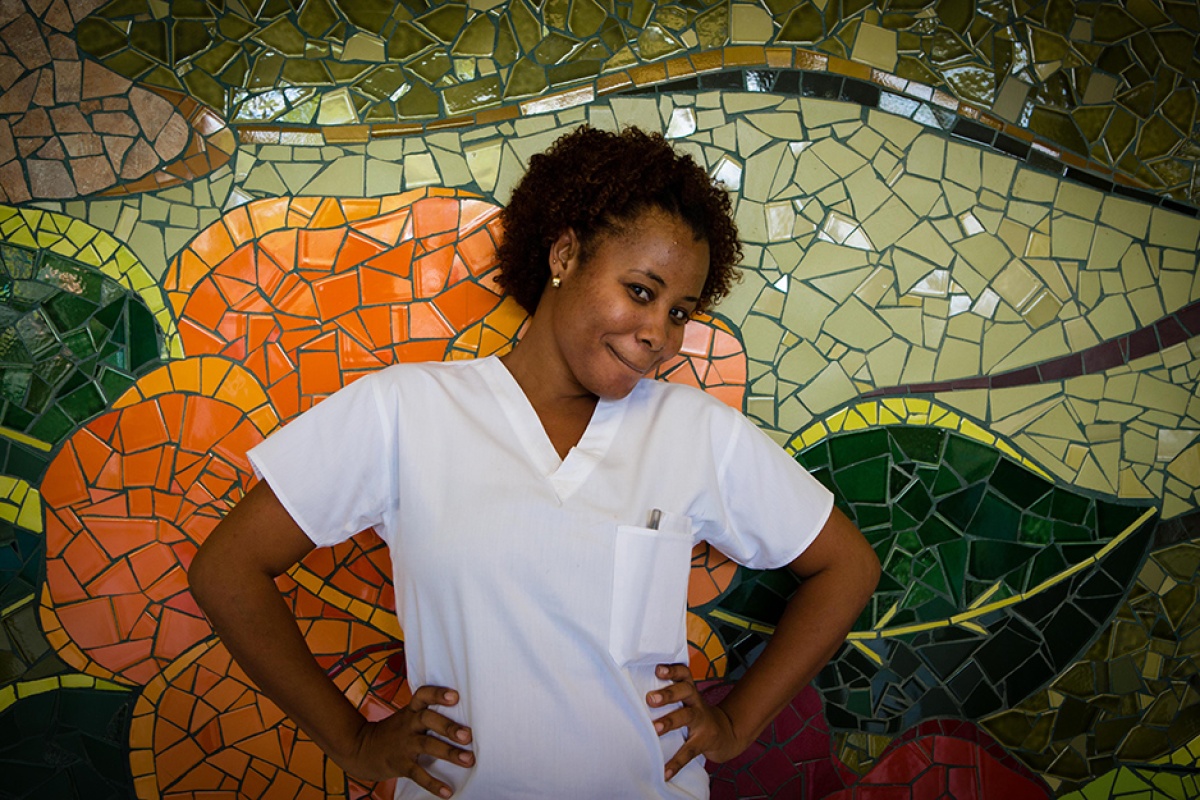The Ups and Downs of an Oncology Nurse in Haiti
Posted on May 11, 2018

Magda Louis Juste is a woman on a mission. She may not be big in stature, and her voice might carry more squeak than roar, but there is no doubt that she commands attention when she enters a room.
Louis Juste is among a tight-knit, highly competent group of oncology nurses at University Hospital in Mirebalais, Haiti. She has been a nurse for eight years, more than half of which have been with Zanmi Lasante, as Partners In Health is known in Haiti.
An extrovert by nature, Louis Juste says she loves her job providing care for the dozens of cancer patients who circulate through the ward every week. But that’s just one outlet for her energy. She is currently studying to become a lawyer, advocates for prisoners’ rights in the capital of Port-au-Prince, and volunteers with a nonprofit called PUSH, which helps young Haitians hone their professional skills and improve their employability.
In honor of International Nurses Day, Louis Juste reflected on her role in Haiti, the importance of advocating for patients, and what the next generation of nurses needs to know.
What do you like most about your job?*
People usually think nurses only give to patients; they don’t realize how much patients give to nurses. When you work with patients, especially those with cancer, they are struggling. They have socioeconomic problems that impact their lives and family, but they’re still strong and happy. That makes you strong. The patients are super heroes to me. They give me strength.
What is the relationship like between doctors and nurses?
A doctor doesn’t collaborate with nurses. They give orders, and you have to execute them.
Usually the doctor writes in a chart and says what they want you to do for each patient. Sometimes they write, ‘Give nursing care.’ I used to say to them that they should not write, ‘Give nursing care.’ I know what I have to do. That’s my job. You can write, ‘Give 20 mg Benadryl for a day.’ But tell me that I should give nursing care? It’s not acceptable. They treat nurses like maids.
But the problem is not just the doctor; it’s the system. In Haiti, there are a lot of nursing schools. A lot of them are not certified. So doctors have seen a lot of nurses who don’t really know what they are doing, and that’s why they think that nurses only give pills or injections.
In what ways do you advocate for your patients?
When a patient comes to the hospital, and the patient is sad, you should notice that as a nurse. You’re not a psychologist, but you should have some notion of psychology to understand patients, talk to them, and refer them to a psychologist. If they are having economic or family problems, you can refer them to a social worker.
Patients sometimes come from very far, and if they are palliative patients who have to come every week, it’s very difficult because they don’t have money for transportation. So they don’t come. Nurses then call to ask why, and patients say they don’t have money. That’s when, as a nurse, you can talk to the doctor, tell them that a particular patient lives far away, and ask them to maybe consider giving chemo to the patient every three weeks. You advocate for the patient, and the patient knows that.
Sometimes doctors give patients medications, and the patients don’t understand what they are supposed to do. They don’t want to talk to the doctors, because they see they are in a hurry. But they know you’re more patient, you have more time for them, and they ask you to help.
I understand nurses sometimes have too many patients. Sometimes the nurse can’t really remember a patient’s name. I think it’s very important to remember. When you do, patients feel safe and that someone cares for them. You have to call patients by their name, not Bed 1.
What advice would you give students interested in nursing in Haiti?
If they want to become a nurse, they have to work hard at school. Sometimes students think that if they’re going to nursing school, they don’t need to know anything about math, that they just need to know biology or chemistry. It’s not true. You have to learn everything. Whatever they offer at school, you take it.
When you are searching for a nursing school, check to see that it’s certified. Then when you are at school, you have to learn to become a very competent nurse. If you’re competent and do your job, people will respect you.
I want nurses to be aware of their position, of their worth. They shouldn’t just give pills or execute orders. We need to have more professional development opportunities for nurses in Haiti so that they can take advantage of the broad scope of specialization within the field. We need to start to change the image of nursing here. If you are a nurse, you are competent, and you should have autonomy to do your job.
*This interview has been edited and condensed.

